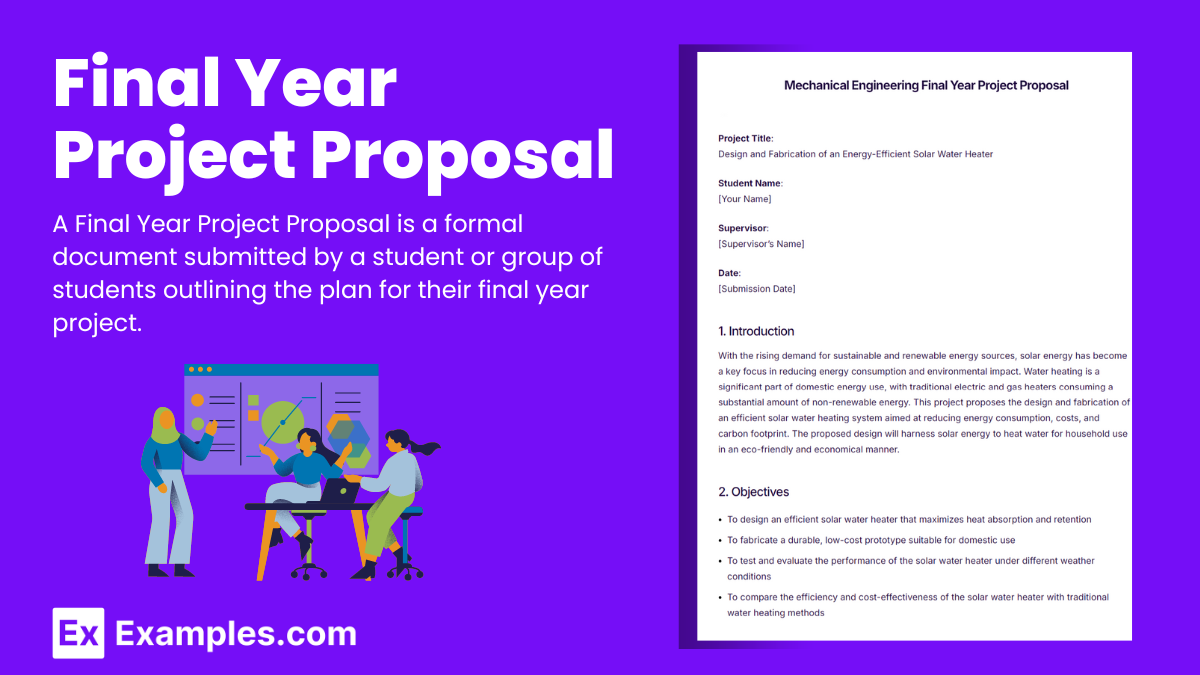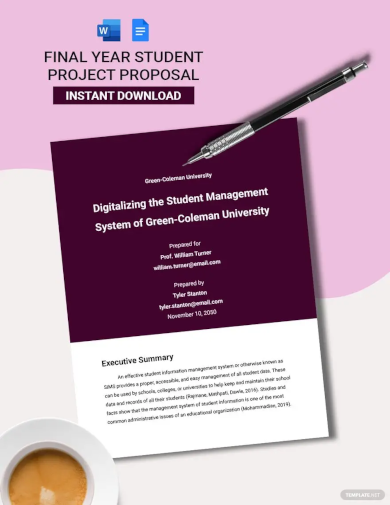13+ Final Year Project Proposal Examples to Download
As a student, your final year project proposal is one of the most crucial and critical documents that you will be tasked to develop as it can dictate the flow and potential results of the last academic requirement that you will create.
Moreover, this document can also affect your final grade as well as your academic standing especially if you are vying for an honorable mention at the end of the school year. Just like a nonprofit project plan, ensure that your final year project proposal is realistic and measurable so that it will be easier for you to attain the achievement of your goals and objectives.
Since you may have properly been immersed in different educational programs and academic researches, developing a final year project proposal should already come easy for you. However, this does not mean that you have to be lousy when it comes to the creation of the document as it can affect you and your academic life in many more ways than one. You may also see business proposal examples.
To help you come up with an outstanding final year project proposal that is most likely to be approved either by your project adviser or your project panelists, we have put together a list of final year project proposal examples that can be used as your references when formatting the document or listing all the information that you would like to discuss.
What is Final Year Project Proposal?
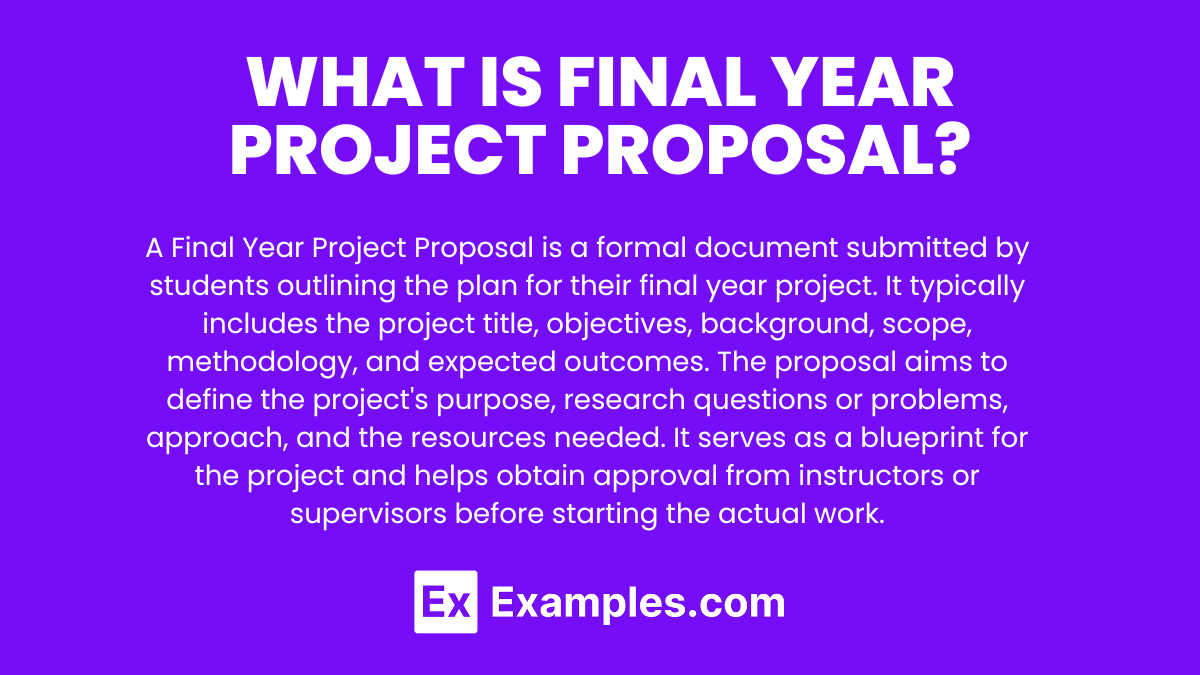
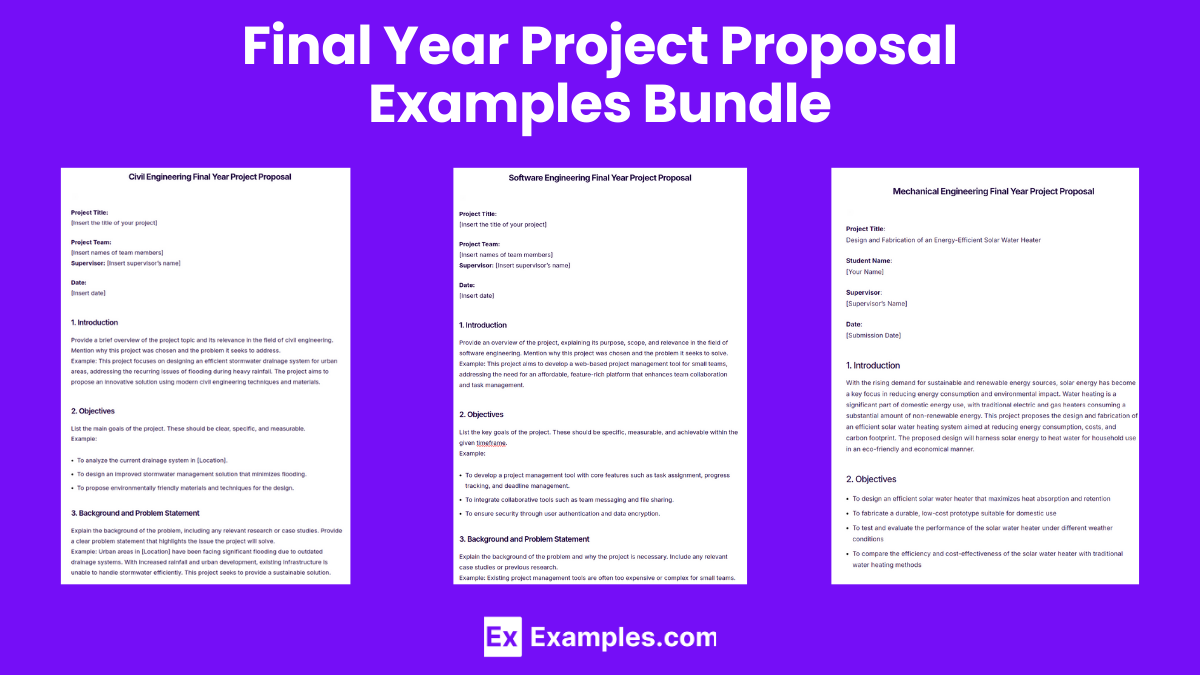
Download Final Year Project Proposal Bundle
Final Year Project Proposal Format
Opening Remarks
- Greeting: Begin with a warm and respectful greeting.
- Example: “Good afternoon, everyone.” or “Ladies and gentlemen,”
Introduction
- Purpose: Briefly state the purpose of your speech.
- Example: “I stand before you to express our sincere gratitude to all those who made this project presentation possible.”
Acknowledgments
Project Supervisors and Advisors
- Recognition: Thank the project supervisors and advisors for their guidance.
- Example: “First and foremost, I would like to thank our project supervisors and advisors for their invaluable guidance throughout this journey.”
Panel of Reviewers
- Appreciation: Acknowledge the contributions of the panelists or reviewers.
- Example: “Our sincere thanks to the distinguished panel for their insightful feedback and suggestions during today’s review.”
Special Guests
- Gratitude: Show appreciation to any special guests or industry professionals.
- Example: “We are grateful to the industry professionals and special guests for their presence and valuable input.”
Team Members
- Acknowledgment: Appreciate your team members for their collaboration and hard work.
- Example: “A big thank you to my teammates for their dedication and hard work in bringing this project to life.”
Support Staff
- Appreciation: Recognize the efforts of any administrative or technical staff who assisted.
- Example: “We also extend our gratitude to the support staff for ensuring all logistical and technical aspects ran smoothly.”
Closing Remarks
- Summarize: Briefly recap the key points of gratitude.
- Example: “In conclusion, we are deeply thankful to everyone who contributed to making this project a success.”
- Final Thanks: Offer a final word of thanks.
- Example: “Thank you all once again for your support and guidance.”
Farewell
- Goodbye: End with a polite farewell.
- Example: “We wish you all the best and look forward to continuing our journey. Thank you.”
Short Final Year Project Proposal Example
Civil Engineering Final Year Project Proposal
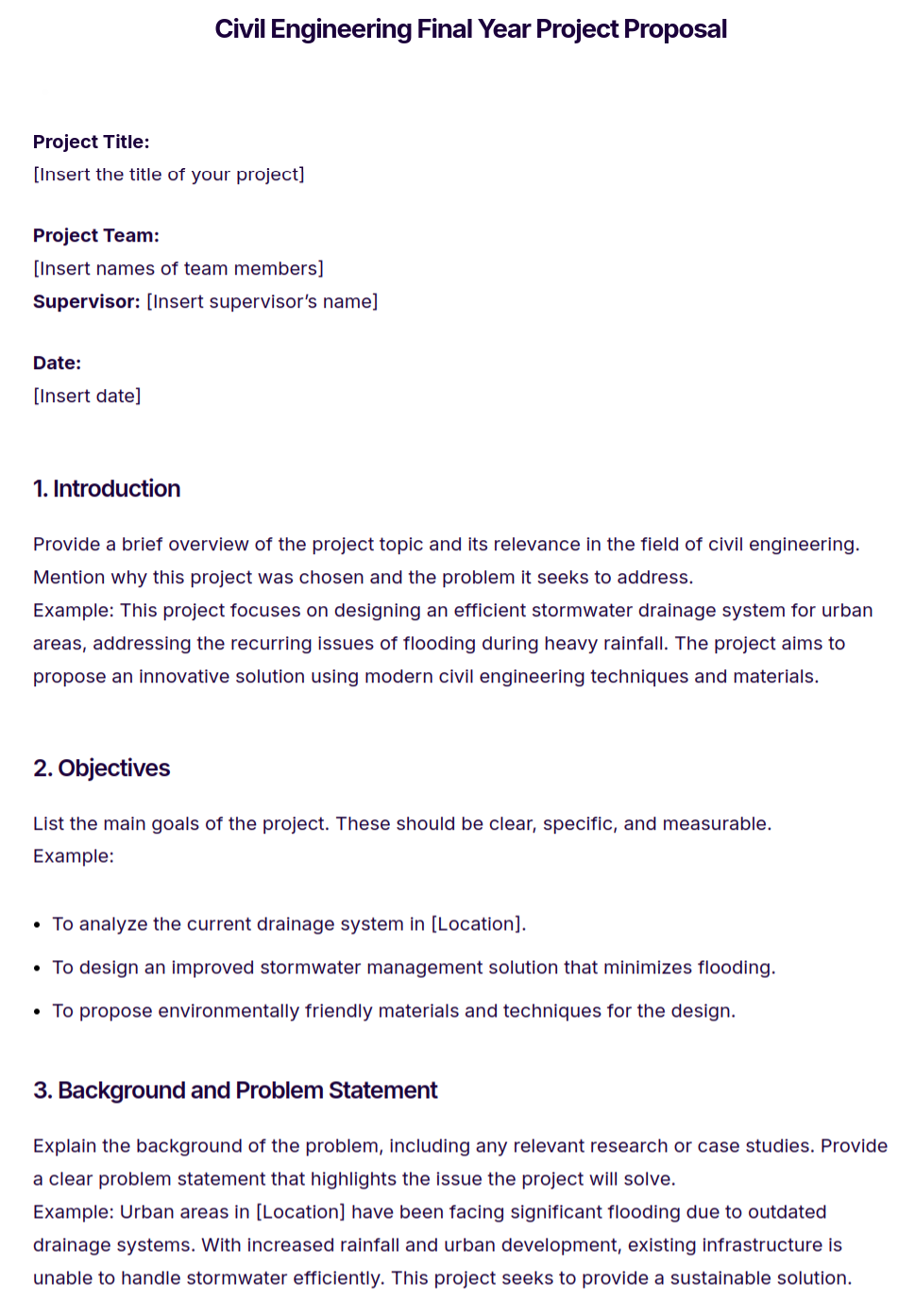
Software Engineering Final Year Project Proposal
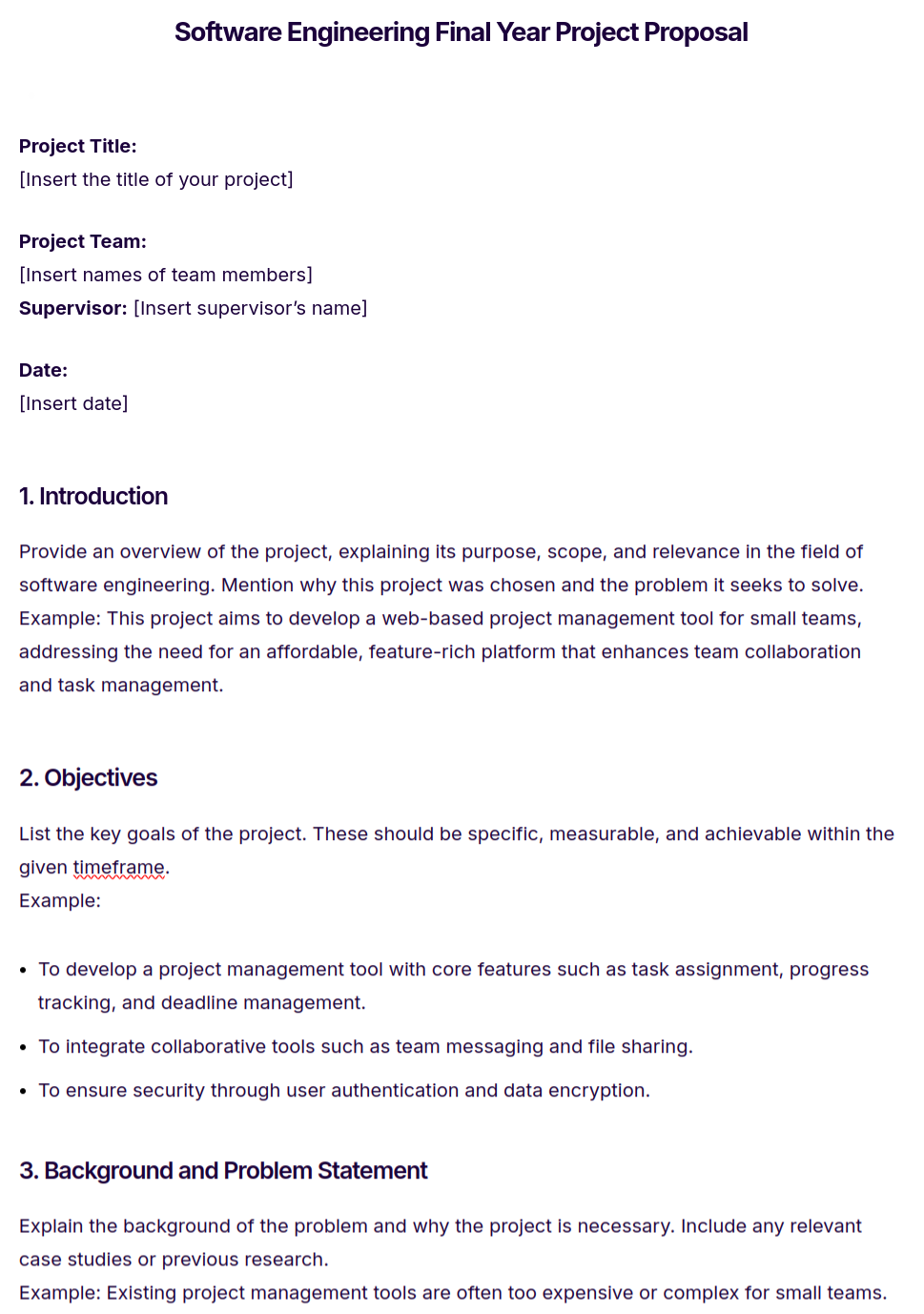
Mechanical Engineering Final Year Project Proposal
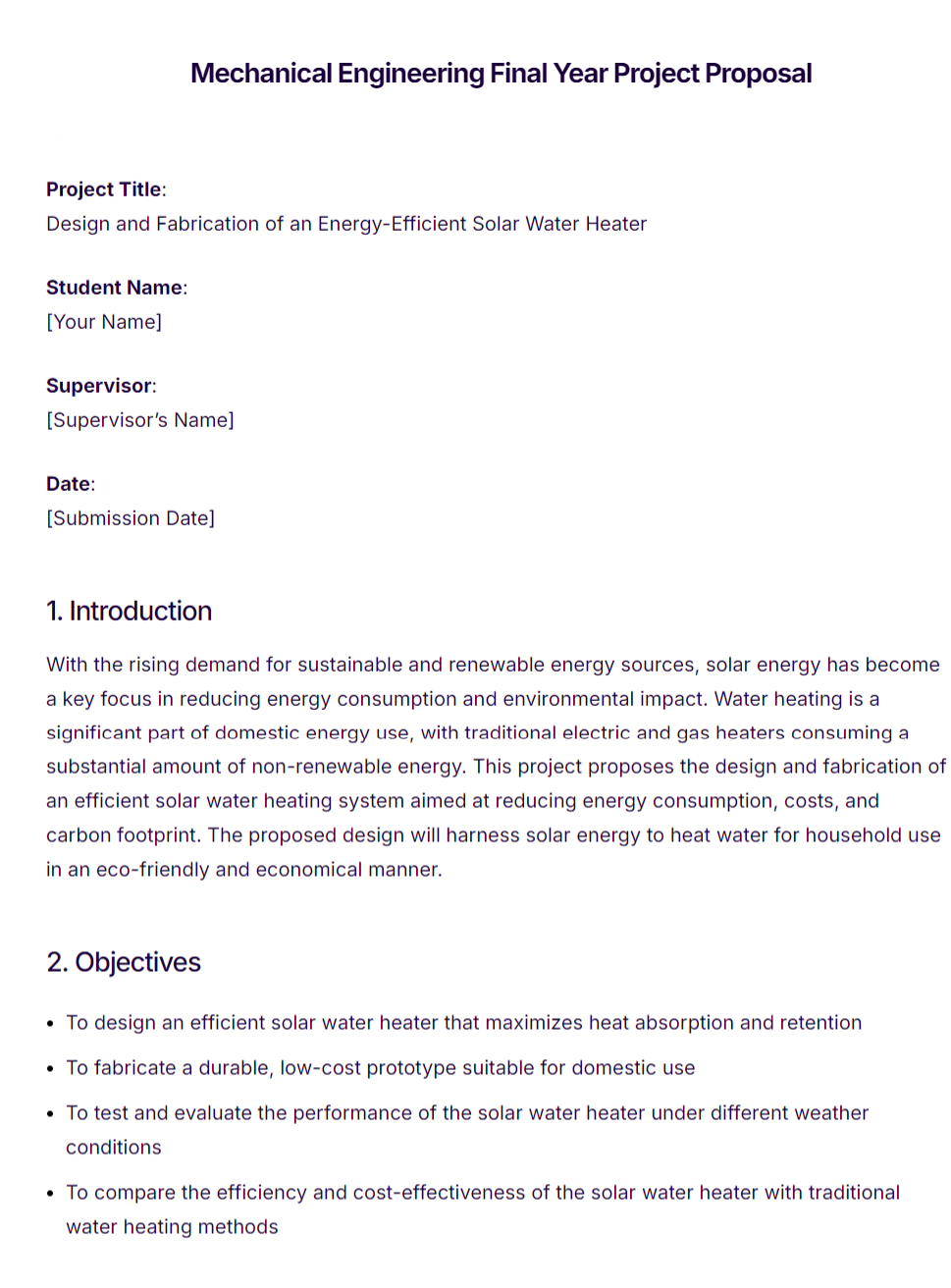
More Final Year Project Proposal Examples and Samples
- Final Year Project Proposal For Computer Science Students
- Electrical Engineering Final Year Project Proposal
- Final Year Project Management System Proposal
- Final Year Project Proposal For Mass Communication
- Final Year Project Proposal For Information Technology
1. Final Year Student Project Proposal
2. Final Year Project Proposal Example
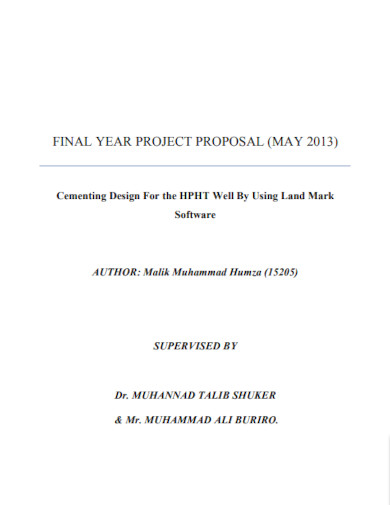
3. Final Year Computer Science Project Proposal
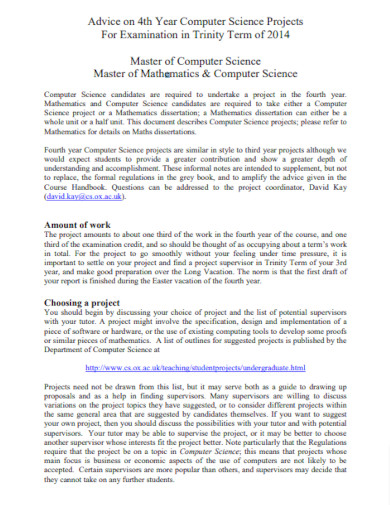
4. Sample Final Year Project Proposal Form Example
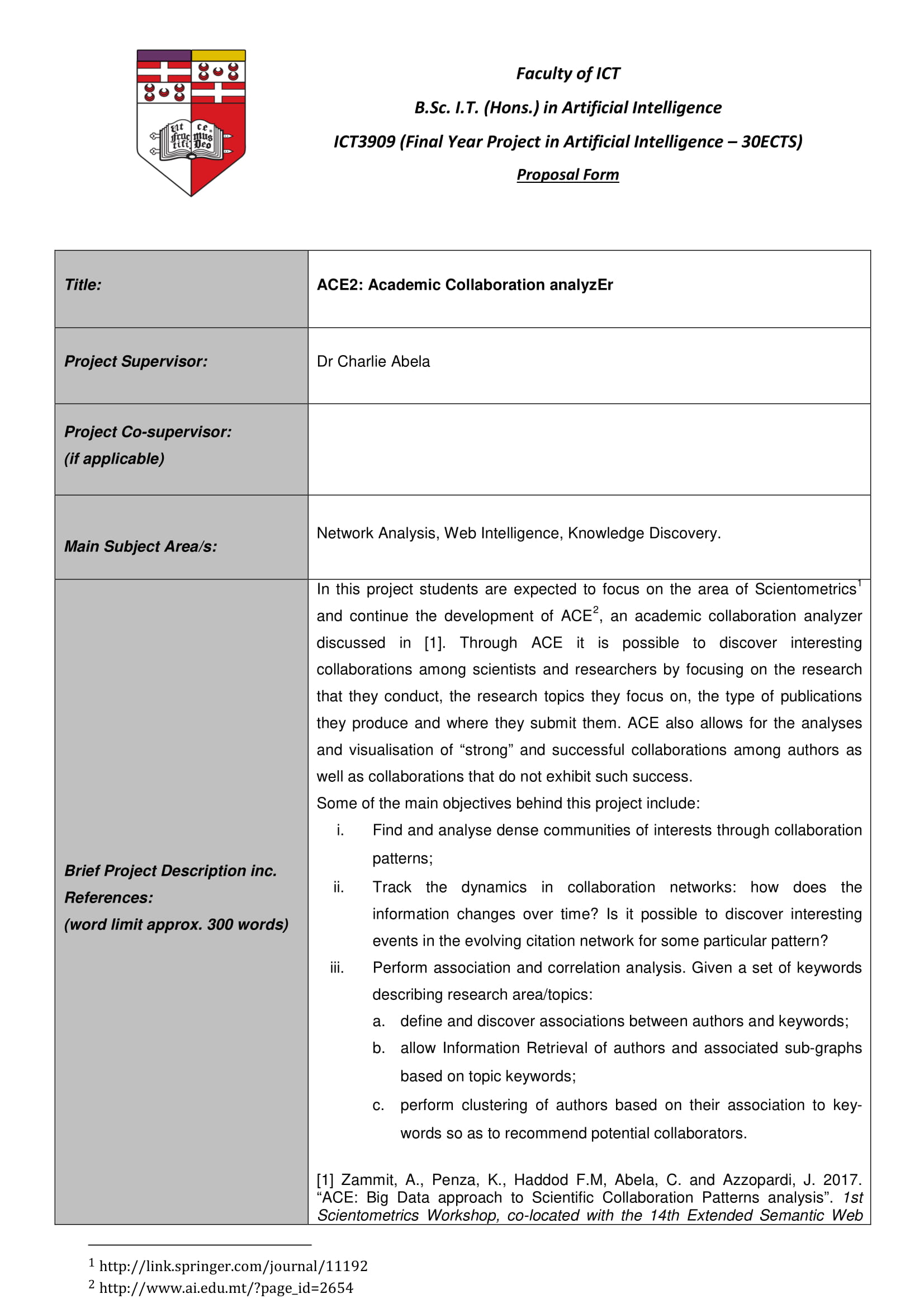
5. Basic Final Year Project Proposal Example
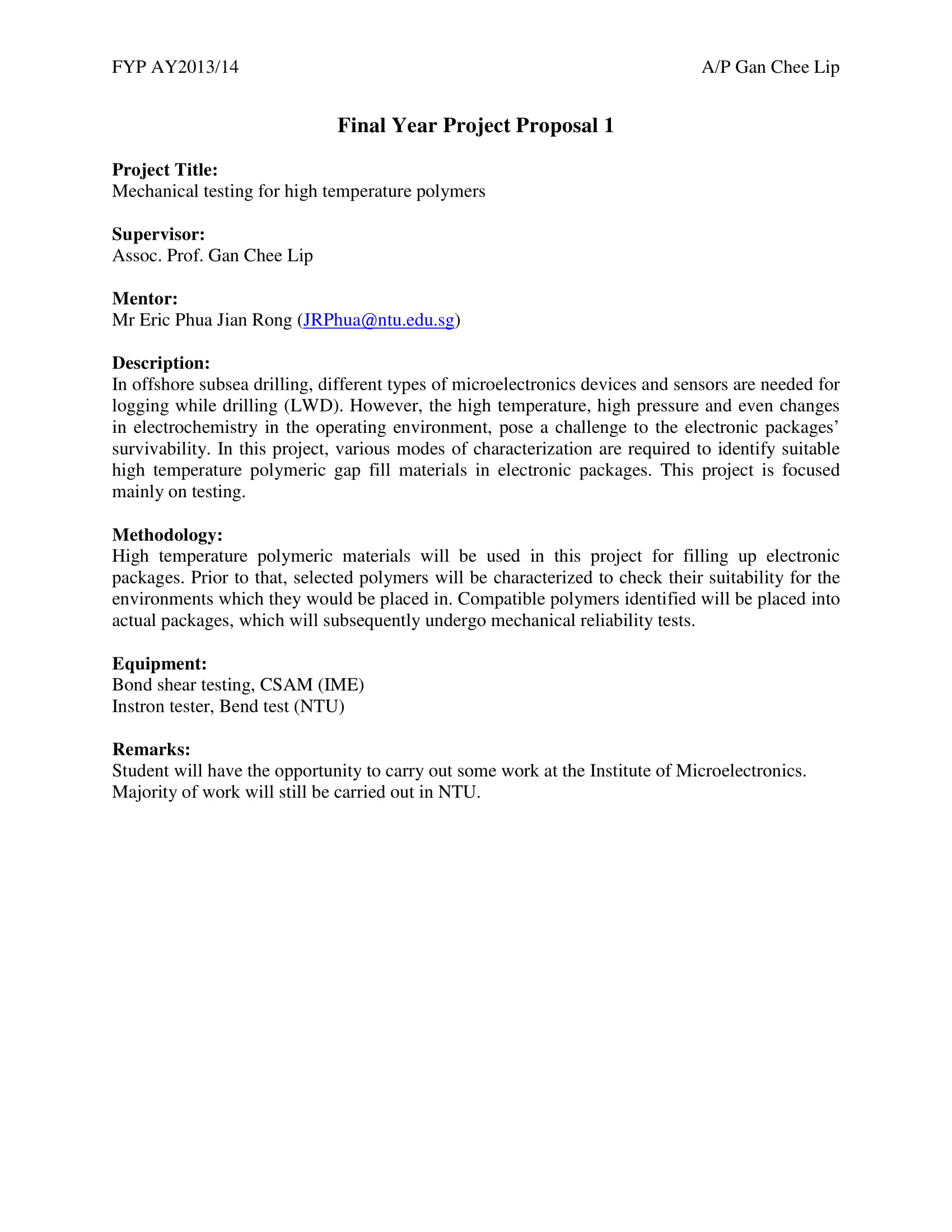
How do you write a Final Year Project Proposal?
Writing a Final Year Project Proposal involves presenting a clear, structured plan for your project, outlining your goals, methodology, and expected outcomes. Here’s a step-by-step guide on how to write an effective project proposal:
Title
Choose a clear and concise title that reflects the main objective of your project.
It should be specific and give a good sense of what the project is about.Introduction
Provide an overview of the project and its background.
Explain the relevance and importance of the project within your field of study.
Highlight any problems, gaps, or needs that your project addresses.
State your motivation for choosing the project.Objectives
List the primary objectives or goals of the project.
Be specific about what you intend to achieve with the project (e.g., “To develop a machine learning model that predicts stock prices with 80% accuracy”).
Keep the objectives measurable and attainable.Problem Statement
Identify the problem or challenge that the project aims to solve.
Explain why the problem is important, and describe the context in which it exists.
Discuss the significance of solving this problem in your field of study or industry.Methodology
Outline the steps you will take to complete the project.
Describe the methods and techniques you will use (e.g., surveys, experiments, programming languages, algorithms, etc.).
Include details on tools, technologies, or frameworks required to complete the project.
Mention how you will collect and analyze data if applicable.Resources/Tools
List the resources and tools needed for the project (e.g., software, hardware, datasets, libraries).
If you need external resources, explain how you will obtain them.Timeline
Provide a project timeline that breaks the work into phases or tasks.
Indicate key milestones, deadlines, and the overall duration of the project.
Include deliverables for each phase if applicable.Expected Outcomes
Describe the expected outcomes or results of the project.
What are the final deliverables? (e.g., a software application, a research report, a prototype, etc.)
Indicate the potential benefits or applications of your project.Literature Review (Optional)
Include a brief review of existing research or projects that relate to your topic.
Explain how your project builds on or differs from previous work.
Highlight any theoretical or practical contributions your project could make.Budget (Optional)
If necessary, include a budget outlining the costs involved (e.g., materials, software licenses, equipment).
Break down the costs and explain how you will fund the project.Conclusion
Summarize the main points of the proposal.
Reinforce the importance of the project and its potential impact.
State any expected challenges and how you plan to address them.
Tips for Final Year Project Proposal
- Title: Choose a clear, specific, and concise title that reflects the core of your project.
- Introduction: Provide background information, explain the relevance of your project, and define the problem it addresses.
- Objectives: Clearly list the specific goals and outcomes you aim to achieve with the project.
- Problem Statement: Define the issue or gap your project will solve, emphasizing its importance in your field.
- Methodology: Describe the step-by-step approach, tools, and techniques you will use to carry out the project.
- Resources/Tools: List the software, hardware, and other resources needed to complete the project.
- Timeline: Break your project into phases and provide a realistic timeline with key milestones.
- Expected Outcomes: Describe what you plan to deliver, such as a prototype, report, or software, and the impact of your project.
- Impact and Relevance: Explain how your project will benefit your field or address real-world problems.
- Conclusion: Summarize the significance of your project and its potential contributions, reinforcing its importance.
FAQS
1. How do I justify the importance of my Final Year Project Proposal?
In your introduction and problem statement, explain the significance of the project by highlighting the gap it fills, the problem it solves, or the contribution it makes to the field or industry.
2. How long should my Final Year Project Proposal be?
The length depends on your institution’s guidelines, but typically it ranges from 3 to 5 pages. It should be concise but detailed enough to cover the key aspects like objectives, methodology, and timeline.
3. Why is writing a Final Year Project Proposal important?
Writing a proposal helps clarify the goals, scope, and significance of your project. It is also essential for securing approval from your supervisor and ensuring your project is well-planned and feasible.
4. How do I choose a topic for my Final Year Project Proposal?
Choose a topic that interests you, aligns with your field of study, and addresses a current problem or trend. Make sure it is feasible within your timeframe and available resources.
5. How detailed should the timeline be in a Final Year Project Proposal?
The timeline should be detailed enough to show key milestones, phases, and deadlines. It helps ensure that you stay on track and complete your project within the required timeframe.
6. What challenges might I face in creating a Final Year Project Proposal?
You might face challenges such as topic selection, resource availability, time management, or technical limitations. It’s important to address these challenges in the proposal and have contingency plans.
7. Can I make changes to my Final Year Project Proposal after submission?
Yes, if changes are necessary, communicate with your supervisor for approval. Modifying the scope or methodology is common as long as it remains aligned with your objectives.
8. How do I make my Final Year Project Proposal stand out?
To make your proposal stand out, ensure it addresses a significant problem, is well-organized, and includes innovative or practical applications. Strong research and clear objectives will also make a big impact.


